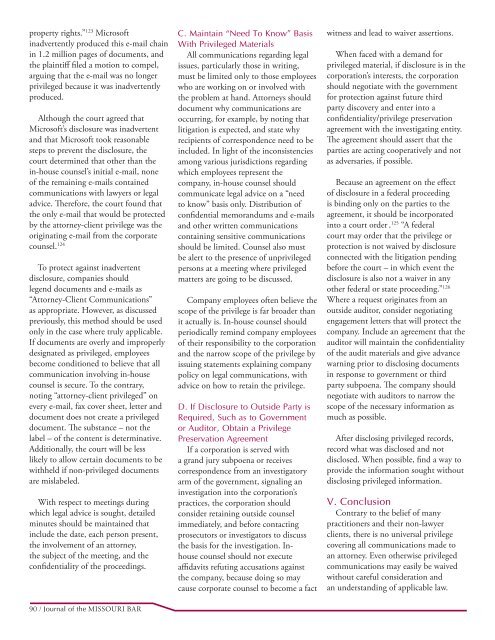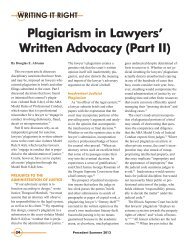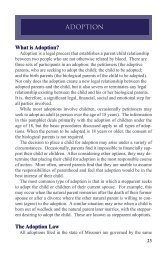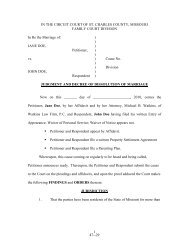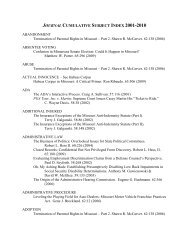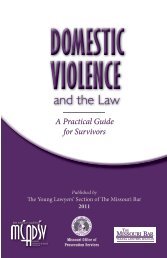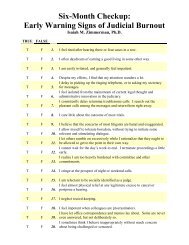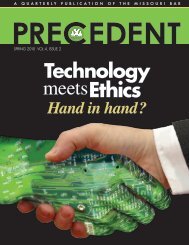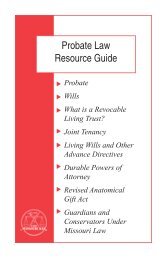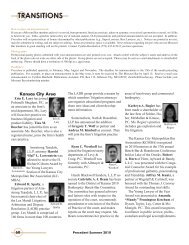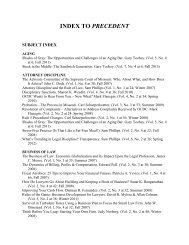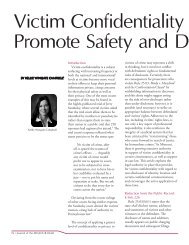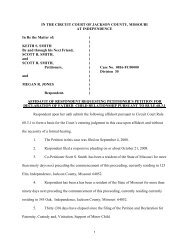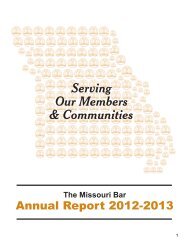An Essential Guide to Attorney-Client Privilege ... - the Missouri Bar
An Essential Guide to Attorney-Client Privilege ... - the Missouri Bar
An Essential Guide to Attorney-Client Privilege ... - the Missouri Bar
- No tags were found...
You also want an ePaper? Increase the reach of your titles
YUMPU automatically turns print PDFs into web optimized ePapers that Google loves.
property rights.” 123 Microsoftinadvertently produced this e-mail chainin 1.2 million pages of documents, and<strong>the</strong> plaintiff filed a motion <strong>to</strong> compel,arguing that <strong>the</strong> e-mail was no longerprivileged because it was inadvertentlyproduced.Although <strong>the</strong> court agreed thatMicrosoft’s disclosure was inadvertentand that Microsoft <strong>to</strong>ok reasonablesteps <strong>to</strong> prevent <strong>the</strong> disclosure, <strong>the</strong>court determined that o<strong>the</strong>r than <strong>the</strong>in-house counsel’s initial e-mail, noneof <strong>the</strong> remaining e-mails containedcommunications with lawyers or legaladvice. Therefore, <strong>the</strong> court found that<strong>the</strong> only e-mail that would be protectedby <strong>the</strong> at<strong>to</strong>rney-client privilege was <strong>the</strong>originating e-mail from <strong>the</strong> corporatecounsel. 124To protect against inadvertentdisclosure, companies shouldlegend documents and e-mails as“At<strong>to</strong>rney-<strong>Client</strong> Communications”as appropriate. However, as discussedpreviously, this method should be usedonly in <strong>the</strong> case where truly applicable.If documents are overly and improperlydesignated as privileged, employeesbecome conditioned <strong>to</strong> believe that allcommunication involving in-housecounsel is secure. To <strong>the</strong> contrary,noting “at<strong>to</strong>rney-client privileged” onevery e-mail, fax cover sheet, letter anddocument does not create a privilegeddocument. The substance – not <strong>the</strong>label – of <strong>the</strong> content is determinative.Additionally, <strong>the</strong> court will be lesslikely <strong>to</strong> allow certain documents <strong>to</strong> bewithheld if non-privileged documentsare mislabeled.With respect <strong>to</strong> meetings duringwhich legal advice is sought, detailedminutes should be maintained thatinclude <strong>the</strong> date, each person present,<strong>the</strong> involvement of an at<strong>to</strong>rney,<strong>the</strong> subject of <strong>the</strong> meeting, and <strong>the</strong>confidentiality of <strong>the</strong> proceedings.C. Maintain “Need To Know” BasisWith <strong>Privilege</strong>d MaterialsAll communications regarding legalissues, particularly those in writing,must be limited only <strong>to</strong> those employeeswho are working on or involved with<strong>the</strong> problem at hand. At<strong>to</strong>rneys shoulddocument why communications areoccurring, for example, by noting thatlitigation is expected, and state whyrecipients of correspondence need <strong>to</strong> beincluded. In light of <strong>the</strong> inconsistenciesamong various jurisdictions regardingwhich employees represent <strong>the</strong>company, in-house counsel shouldcommunicate legal advice on a “need<strong>to</strong> know” basis only. Distribution ofconfidential memorandums and e-mailsand o<strong>the</strong>r written communicationscontaining sensitive communicationsshould be limited. Counsel also mustbe alert <strong>to</strong> <strong>the</strong> presence of unprivilegedpersons at a meeting where privilegedmatters are going <strong>to</strong> be discussed.Company employees often believe <strong>the</strong>scope of <strong>the</strong> privilege is far broader thanit actually is. In-house counsel shouldperiodically remind company employeesof <strong>the</strong>ir responsibility <strong>to</strong> <strong>the</strong> corporationand <strong>the</strong> narrow scope of <strong>the</strong> privilege byissuing statements explaining companypolicy on legal communications, withadvice on how <strong>to</strong> retain <strong>the</strong> privilege.D. If Disclosure <strong>to</strong> Outside Party isRequired, Such as <strong>to</strong> Governmen<strong>to</strong>r Audi<strong>to</strong>r, Obtain a <strong>Privilege</strong>Preservation AgreementIf a corporation is served witha grand jury subpoena or receivescorrespondence from an investiga<strong>to</strong>ryarm of <strong>the</strong> government, signaling aninvestigation in<strong>to</strong> <strong>the</strong> corporation’spractices, <strong>the</strong> corporation shouldconsider retaining outside counselimmediately, and before contactingprosecu<strong>to</strong>rs or investiga<strong>to</strong>rs <strong>to</strong> discuss<strong>the</strong> basis for <strong>the</strong> investigation. Inhousecounsel should not executeaffidavits refuting accusations against<strong>the</strong> company, because doing so maycause corporate counsel <strong>to</strong> become a factwitness and lead <strong>to</strong> waiver assertions.When faced with a demand forprivileged material, if disclosure is in <strong>the</strong>corporation’s interests, <strong>the</strong> corporationshould negotiate with <strong>the</strong> governmentfor protection against future thirdparty discovery and enter in<strong>to</strong> aconfidentiality/privilege preservationagreement with <strong>the</strong> investigating entity.The agreement should assert that <strong>the</strong>parties are acting cooperatively and notas adversaries, if possible.Because an agreement on <strong>the</strong> effec<strong>to</strong>f disclosure in a federal proceedingis binding only on <strong>the</strong> parties <strong>to</strong> <strong>the</strong>agreement, it should be incorporatedin<strong>to</strong> a court order . 125 “A federalcourt may order that <strong>the</strong> privilege orprotection is not waived by disclosureconnected with <strong>the</strong> litigation pendingbefore <strong>the</strong> court – in which event <strong>the</strong>disclosure is also not a waiver in anyo<strong>the</strong>r federal or state proceeding.” 126Where a request originates from anoutside audi<strong>to</strong>r, consider negotiatingengagement letters that will protect <strong>the</strong>company. Include an agreement that <strong>the</strong>audi<strong>to</strong>r will maintain <strong>the</strong> confidentialityof <strong>the</strong> audit materials and give advancewarning prior <strong>to</strong> disclosing documentsin response <strong>to</strong> government or thirdparty subpoena. The company shouldnegotiate with audi<strong>to</strong>rs <strong>to</strong> narrow <strong>the</strong>scope of <strong>the</strong> necessary information asmuch as possible.After disclosing privileged records,record what was disclosed and notdisclosed. When possible, find a way <strong>to</strong>provide <strong>the</strong> information sought withoutdisclosing privileged information.V. ConclusionContrary <strong>to</strong> <strong>the</strong> belief of manypractitioners and <strong>the</strong>ir non-lawyerclients, <strong>the</strong>re is no universal privilegecovering all communications made <strong>to</strong>an at<strong>to</strong>rney. Even o<strong>the</strong>rwise privilegedcommunications may easily be waivedwithout careful consideration andan understanding of applicable law.90 / Journal of <strong>the</strong> MISSOURI BAR


